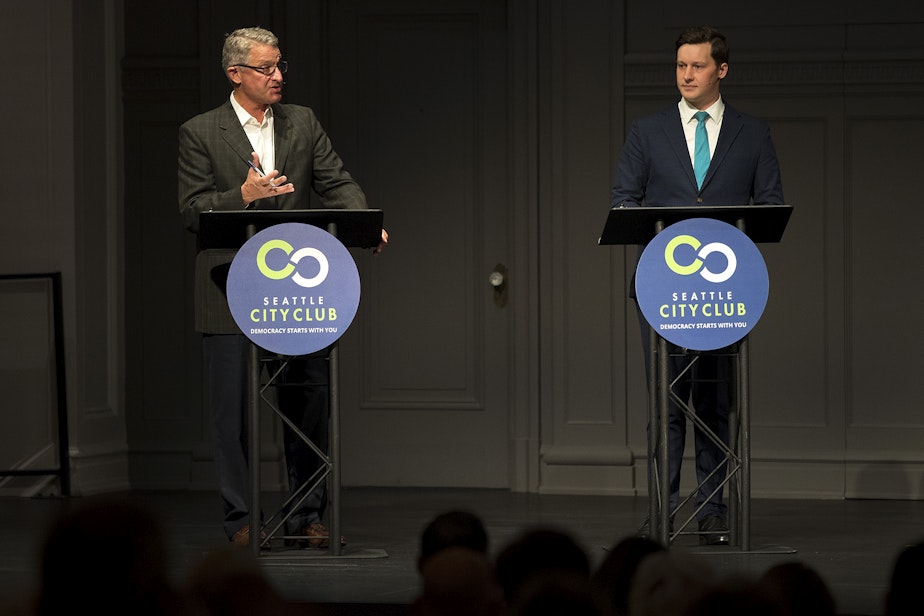Business tries to claw its way back in Seattle City Council races

The labor movement is in the driver's seat on the Seattle City Council right now. But with seven seats in play this year, business is trying to grab the wheel.
Currently, labor unions can usually get the council's support for legislation that they endorse.
And the labor movement has had some really big wins. In 2014, a historic $15 minimum wage law passed, and last year the city passed the Domestic Workers Bill of Rights.
Nobody running for office in Seattle vows to reverse those hard-won worker protections. But labor still wants to maintain a near-bulletproof majority on the council.
The labor movement's vision for the future could include ambitious proposals to help gig economy workers like Ulysses Galvez, a former Marine who served in Iraq and Afghanistan.
Galvez recently testified before the City Council.
Sponsored
"I came back with my body, but my mind and my soul have been broken. I can't hold a regular job because of the things that I saw and the things that I did for my country,” Galvez said.
Galvez said he has post-traumatic stress disorder and can only work part time. He took a job with flexible work hours for an app-based company called Instacart that delivers groceries on demand.
But because he's a contract worker, Galvez is not guaranteed the same protections as many other workers, including a minimum wage.
Rachel Lauter wants Seattle to do more to protect gig workers like Galvez. She heads a group called Working Washington, which helped launch the minimum wage movement.
“The city can make sure people working in the gig economy have the same benefits and rights that other workers benefit from,” Lauter said.
Sponsored
Last year Seattle did just that for domestic workers, like house cleaners and home care workers. But Lauter and other leaders worry that labor's clout in Seattle could diminish after the November election.
A few races could tip the balance on the council, including District 7, which includes Magnolia and downtown Seattle.
In that race, city prosecutor Andrew Lewis has backing from most organized labor unions, including UNITE HERE! Local 8, which represents hotel workers. The UNITE HERE! Local 8 PAC has raised hundreds of thousands of dollars for independent expenditures in support of Lewis.
Labor leaders who back him say they trust Lewis to represent their interests on the City Council.
Lewis’s opponent, former Police Chief Jim Pugel, is also endorsed by some unions, including SEIU 11 and Teamsters Local 117. Pugel sees himself as a pro-labor candidate. But he also said he has “a very balanced endorsement list.”
Sponsored
That’s because Pugel's getting more support than Lewis from business, including the Seattle Chamber of Commerce PAC, the Civic Alliance for a Sound Economy (CASE), which is getting ready to spend big in the fall elections. CASE is funded mostly by big corporations, including Amazon and Vulcan, and by business groups like the Washington Association of Realtors.
Pugel believes everyone, including businesses, should have a "seat at the table" when new legislation is being written. He argues that's not always the case on the current council.
Pugel's supporters also include small business owners like Mike Moon, who has a small smoothie and salad shop in downtown Seattle, just blocks from the Amazon spheres. Moon says the current City Council is ineffective at solving problems that affect small businesses, like clogged traffic and the lack of affordable workforce housing.
“When we started out four years ago, most of the kids that worked for me lived almost within walking distance on Capitol Hill,” Moon said. But in the last year, he said, most people applying for jobs were traveling all the way from Shoreline or Burien.
“The average person is getting priced out, and that makes it hard to get people to show up for an interview, let alone pull shifts,” Moon said.
Sponsored
He recently decided to sell his business, and he has no plans to open another in downtown Seattle.
“I don't think that I would, at least not for a while," Moon said. "All those folks that work on the lower end of the wage scale don't live here, and it is really a challenge to find workers.”
Like the Chamber of Commerce, Moon is hoping the council will shift toward more business-friendly candidates like Pugel.
Stay in the know by subscribing to KUOW's Election Newsletter. Each week, we'll send you updates on stories to watch and news not to miss. Sign up at kuow.org/elections.




